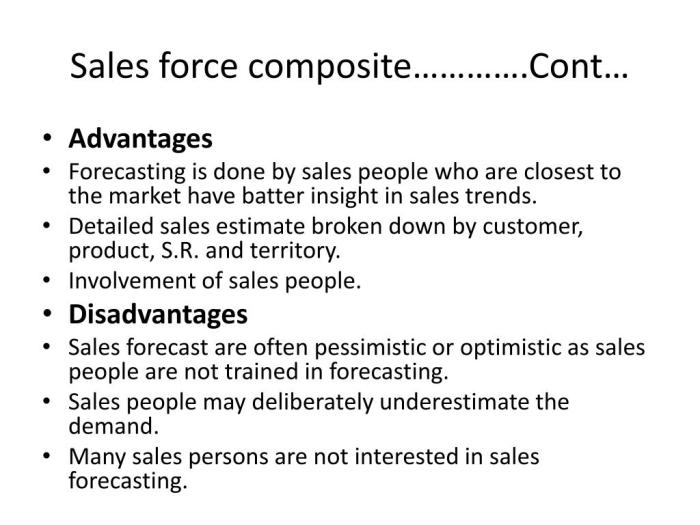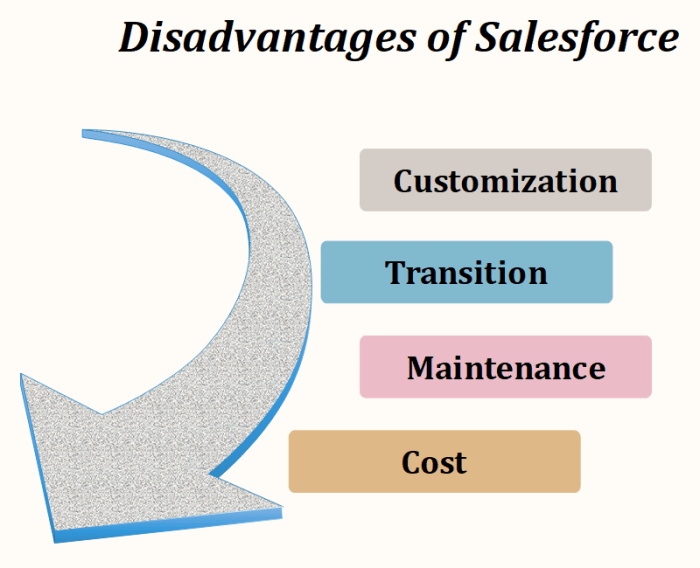Disadvantages of sales force composite method – The sales force composite method, while widely used to assess sales performance, harbors significant disadvantages that warrant careful consideration. This method, which combines multiple sales metrics into a single composite score, faces inherent limitations, data collection challenges, and subjective interpretations that can compromise its accuracy and effectiveness.
This comprehensive analysis delves into the complexities of the composite method, examining its fundamental limitations, data reliability issues, subjectivity, and lack of transparency. By exploring alternative methods and their respective limitations, we aim to provide a nuanced understanding of the sales force composite method and its suitability for different performance measurement scenarios.
Disadvantages of Sales Force Composite Method

The sales force composite method is a technique for measuring sales performance by combining multiple metrics into a single score. While this approach can provide a comprehensive view of sales performance, it also has several inherent limitations.
Inherent Limitations of the Composite Method
- Challenges in Combining Metrics:Combining different sales metrics can be challenging due to their varying nature and scales. This can lead to inaccuracies in the composite score if the metrics are not properly weighted or standardized.
- Establishing a Meaningful Composite Score:Developing a composite score that accurately reflects overall sales performance can be difficult. The choice of metrics, their weights, and the calculation method can significantly impact the results.
Data Collection and Reliability
- Challenges in Collecting Reliable Data:Gathering accurate data for multiple sales metrics can be challenging. Salespeople may be biased in their reporting, and data collection methods may vary across different channels or territories.
- Impact of Data Quality:The quality of the data used in the composite method directly affects its accuracy. Inconsistent or unreliable data can lead to misleading results.
Subjectivity and Interpretation
- Subjectivity of Metrics:Individual sales metrics can be subjective, especially those that involve qualitative assessments. This subjectivity can influence the composite score and make it difficult to compare performance across different sales teams.
- Challenges in Interpretation:Interpreting the composite score can be challenging due to its complexity. Different stakeholders may have varying perspectives on the significance of the score, leading to different conclusions about sales performance.
Complexity and Lack of Transparency
- Complexity of the Method:The composite method can be complex to understand and implement. The calculation process and the rationale behind the weights and metrics used may not be transparent, making it difficult to evaluate the accuracy and fairness of the results.
- Lack of Transparency:The lack of transparency in the composite method can hinder communication and decision-making. Salespeople may not fully understand how their performance is measured, which can affect their motivation and performance.
Alternatives and Limitations, Disadvantages of sales force composite method
- Alternative Methods:There are several alternative methods for measuring sales performance, including single-metric approaches, balanced scorecards, and activity-based measures. Each method has its own advantages and disadvantages, and the choice of method depends on the specific needs of the organization.
- Limitations of Alternatives:While alternative methods may address some of the limitations of the composite method, they also have their own limitations. Single-metric approaches can be overly simplistic, balanced scorecards can be complex to implement, and activity-based measures may not capture all aspects of sales performance.
Answers to Common Questions: Disadvantages Of Sales Force Composite Method
What are the primary disadvantages of the sales force composite method?
The composite method faces challenges in combining different metrics, establishing a meaningful composite score, and ensuring data reliability. It can also be complex and lack transparency, making it difficult to understand and communicate sales performance effectively.
How does subjectivity impact the composite method?
The subjectivity of individual sales metrics can influence the composite score, leading to varying interpretations and evaluations of sales performance. This subjectivity can compromise the accuracy and reliability of the method.
Are there alternative methods for measuring sales force performance?
Yes, alternative methods include the quota attainment method, weighted average method, and activity-based method. Each method has its own advantages and limitations, and the suitability of a particular method depends on the specific sales context and performance objectives.

